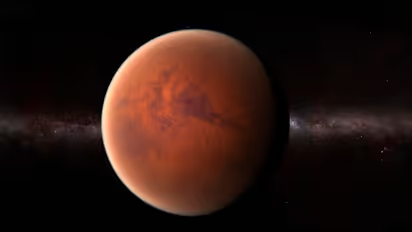Surprising revelation: NASA says Mars is spinning faster, day shrinking on red planet

Synopsis
NASA's InSight Lander data reveals Mars is spinning faster, with its axial rotation accelerating, presenting intriguing insights into the Red Planet's dynamics.
Data analysis from NASA's InSight Lander has brought to light a notable discovery: Mars is spinning faster! The lander diligently operated for four years before its extended mission concluded due to power depletion in December 2022. The comprehensive findings have been unveiled through a recent publication in Nature, presenting what scientists consider to be the most meticulous measurement ever obtained of Mars' rotational behaviour. The pivotal revelation indicates that Mars' axial rotation is intensifying at a rate of roughly 4 milliarcseconds annually. This minute but significant acceleration corresponds to a fractional shortening of a millisecond in the Martian day each year.
The noteworthy study featured contributions from researchers associated with NASA's Jet Propulsion Laboratory. Although the underlying cause for this acceleration in the Red Planet's rotation remains elusive, the scientists propose several conceivable explanations.
One theory points towards the gradual accumulation of ice on Mars' polar caps as a potential catalyst. The scientists elucidate that alterations in a planet's mass can prompt an acceleration effect akin to a figure skater spinning faster upon retracting their outstretched arms.
Expressing his enthusiasm, Bruce Banerdt, the principal investigator of InSight at NASA's Jet Propulsion Laboratory, remarked, "It's really cool to be able to get this latest measurement - and so precisely. I've been involved in efforts to get a geophysical station like InSight onto Mars for a long time, and results like this make all those decades of work worth it," as conveyed through a release on NASA's official website.
The dataset underpinning this revelation was diligently gathered by a radio transponder on the InSight Lander, working in tandem with a cluster of antennas collectively known as the Rotation and Interior Structure Experiment, or RISE.
The RISE project represents the latest in a series of equipment dispatched to Mars, succeeding the earlier endeavors such as the twin Viking landers of the 1970s and the Pathfinder mission in the 1990s. Notably enhanced capabilities incorporated into RISE have rendered it capable of capturing data with an accuracy five times greater than what was attainable through the Viking landers' technology.
Check the Breaking News Today and Latest News from across India and around the world. Stay updated with the latest World News and global developments from politics to economy and current affairs. Get in-depth coverage of China News, Europe News, Pakistan News, and South Asia News, along with top headlines from the UK and US. Follow expert analysis, international trends, and breaking updates from around the globe. Download the Asianet News Official App from the Android Play Store and iPhone App Store for accurate and timely news updates anytime, anywhere.